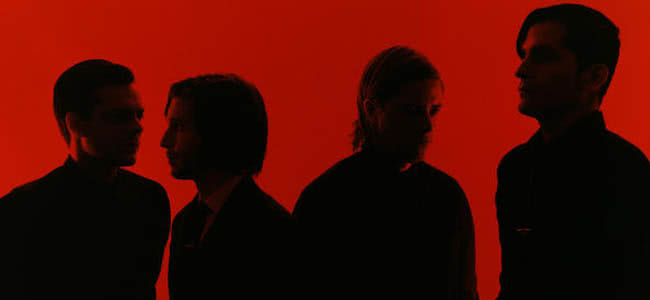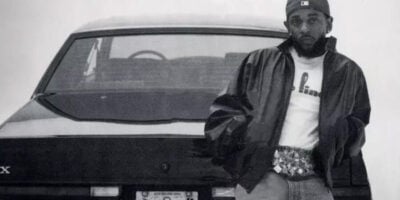There are two inescapable truths about Interpol.
The first is that they are from New York City, and that’s important. The second is that they sound a bit like Joy Division… alright, shall we move on?
Interpol’s seminal debut album Turn On The Bright Lights was released on August 20th, 2002 and is officially celebrating its tenth anniversary today with a re-release. Featuring early demo versions of the tracklisting, along with some live video footage and photos; it’s the obligatory anniversary money-making re-release one would expect of an album deemed one of (if not the) most critically acclaimed debut album of the twenty-first century.
Turn On The Bright Lights originally dropped just over a year after fellow New Yorkers The Strokes turned the rock and roll landscape upside down with their 2001 debut, Is This it. Suddenly looking back was looking forward.
The Strokes left two great initial impressions on the music industry. The first was the rise of garage rock, with Julian Casablancas probably able to argue he had a personal hand in the careers of The Libertines, The Hives, and The Vines among countless others. The second was the re-emergence of New York as the hippest musical city on Earth, with The Strokes, Yeah Yeah Yeahs, and the newly emerging Interpol setting tongues wagging the world over.
The band formed way back in 1997 when Daniel Kessler looked to assemble a band at New York University. Finding Carlos Dengler (who at 22 was already retired from music), Paul Banks and Greg Drudy; the group performed around New York to little resolve.Their initial appeal was stylistic as much as it was musical. Clad in Wall Street-friendly suits, and armed with cold, serious demeanours
The band cites Drudy’s departure and Sam Fogarino joining in 2000 as a real turning point. Their next was the following year, when the band were in London for a radio session with perennial tastemaker and legendary radio presenter John Peel. As Paul Banks has stated previously with Clash Music, “it wasn’t until we did a Peel session, as John Peel liked us early on and heard our first demo, which is what got [record label] Matador’s attention and then we got a record deal.”
The band subsequently signed with the taste-making label, and their first release was a three track self-titled EP which dropped only two months before Turn On The Bright Lights. Featuring the album cuts of ‘PDA’ and ‘NYC’ and the since re-released version of ‘Specialist’, it succeeded in adding to the hype surrounding the band ahead of their full length realease.
Their initial appeal was stylistic as much as it was musical. Clad in Wall Street-friendly suits, and armed with cold, serious demeanours; Interpol were, from the get-go, ‘anti-rockstars’.
However, they’ve asserted that their visual aesthetic was never a premeditated affair. “If you look closely you can see we all have our own personal styles; they just all happen to include ties,” explained bassist Carlos Dengler.
Similarly, their grey-scale atmospheres and textures, as well as Paul Banks’ deliberate and powerful monotone delivery, recalled something intrinsically New York. His baritone timbres too recalled Ian Curtis’; however the initial interest in who Interpol sounded like was something lost on its members.
Banks puts it most bluntly, “you probably wouldn’t get very far as a band if you were literally mimicking a certain style. If you could literally say, these are my influences; this is what I want to sound like, then you’re not even really an artist.”
But once Turn On The Bright Lights was released, their musical appeal completely overshadowed people’s conceptions of the band’s Prada suits. Few bands have announced themselves with such clarity; Interpol’s sound was absolutely realised on their first outing.
The album opens with the sprawling ‘Untitled’, with Daniel Kessler’s guitar lines drenched in so much echo it sounds as if it’s reflecting off the surfaces of every Big Apple skyscraper. It’s the perfect introduction to the band; Kessler’s reverb-soaked guitar lines, Sam Fogarino and Carlos Dengler’s rhythmic interplay, and Banks’ understated but compelling vocal delivery; if only for a single repeated line: “I will surprise you sometime/ I’ll come around.”
The album continues on its stellar trajectory with ‘Obstacle 1’. Fogarino channels John Bonham’s bombastic bass drum flourishes in the verse, while Banks has never sounded as urgent (or creepy) as he does when singing “you’ll go stabbing yourself in the neck”.
While the song’s outro doesn’t match the power of its verse (“her stories are boring and stuff/ she’s always calling my bluff”), for a band accused of a lack of emotion, the track is as powerful and affecting as you can get. Similarly, ‘NYC’ builds with walls of melancholic guitars, skittering bass and drums, with Banks lamenting “I know you’ve supported me for a long time/ somehow I’m not impressed.”
On ‘PDA’, never before has a krautrock beat sounded so damn big; with staccato guitar lines combining to create an impenetrable wall of high-end, all the while Banks lyrics are equal parts affection and perversion, “you’re so cute when you’re sedated, dear.”
But for their love of the macabre margins of the emotional spectrum, few bands have created a moment as utterly euphoric as the song’s outro. Building slowly from Kessler’s insistently choppy guitar, to Dengler’s angular bass, before exploding into a pulsing and thoroughly uplifting crescendo.
It’s the band operating in perfect synchronicity, and that’s Interpol at their best. Banks’ solo outings are proof of it.
His first, Julian Plenti Is…Skyscraper is based on songs which all pre-date Bright Lights, and none of them strike with the same force as the interlocking textural configurations of Interpol’s debut. Without the walls of choppy guitars or the foundation of syncopated drums; without Interpol, Banks’ baritone seems lost.
It’s this idea of Interpol as a democratic musical unit which helped inform the band’s very name. Banks has stated that aside from performing its main function (‘sounding cool’), a band name should inform part of their character. It’s this notion of the band’s collective unity which Interpol chose to assert.For their love of the macabre margins of the emotional spectrum, few bands have created a moment as utterly euphoric.
Elsewhere on Bright Lights, the band are as engrossing as ever, there’s an urgency to both ‘Roland’ and ‘Say Hello To The Angels’ which is undeniable, while the downtrodden textures of ‘Hands Away’ recall Joy Division at their bleakest (which is pretty bleak); but there’s a romance to Interpol which undercuts their darker moments.
On ‘The New’, Banks unveils a candid internal monologue about the woman he loves; about how much of himself to give over, and how much to keep for himself. It’s a sincere discussion, before the song loses its emotional engagement and Banks snaps out of his internal dialogue, coldly crooning “you’re looking alright tonight/ I think we should go.”
The album was received with instant critical acclaim, with the two perennial taste-making publications of the UK and America, with NME ranking it favourably and Pitchfork naming it the album of the year.
Their 2004 follow-up Antics eschewed their bleakest characteristics, favouring their pulsating rhythms. Considered a fantastic album in its own right, the only downside was the insurmountable expectations Bright Lights had garnered them. It’s these expectations which would be the biggest burden on an otherwise lofty career.
Their third album, and major label debut (for Capitol), Our Love To Admire tried even harder to distance Interpol from the weight of their debut, but in the end suffered from formulaic songwriting. Finally, ahead of 2010’s self-titled album the band wavered to the pressure their debut had exerted over their subsequent albums.
Initially touted by Fogarino as sounding like their debut album, telling Paste magazine, that “in trying to move forward, there was an unspoken realisation that [we] can’t let go of your sonic-defining tag;” fans were excited for 2010’s Interpol, but in the end the album paled in comparison to any of their previous work.
To this day Turn On The Bright Lights has sold just over 500,000 copies worldwide, while their subsequent albums sold similar amounts, it was to increasingly less critical acclaim.
It’s hard to follow up such a barnstorming debut, but Interpol have still etched themselves a spot in the history of modern music. Originally conceived amongst the denim and leather-clad revelry of the garage-rock revolution; Turn On The Bright Lights stood alone as a great emotional expanse, and still stands as one of the most immersive albums in living memory.
While their iconic bass player Carlos D has since left the group, and Paul Banks having just released his second solo album; by all accounts, things are looking grim on the Interpol front. But, Banks has reassured that Interpol is still an ongoing concern. Here’s hoping that whatever comes next turns on the bright lights as much as their debut did for them a decade ago.


































